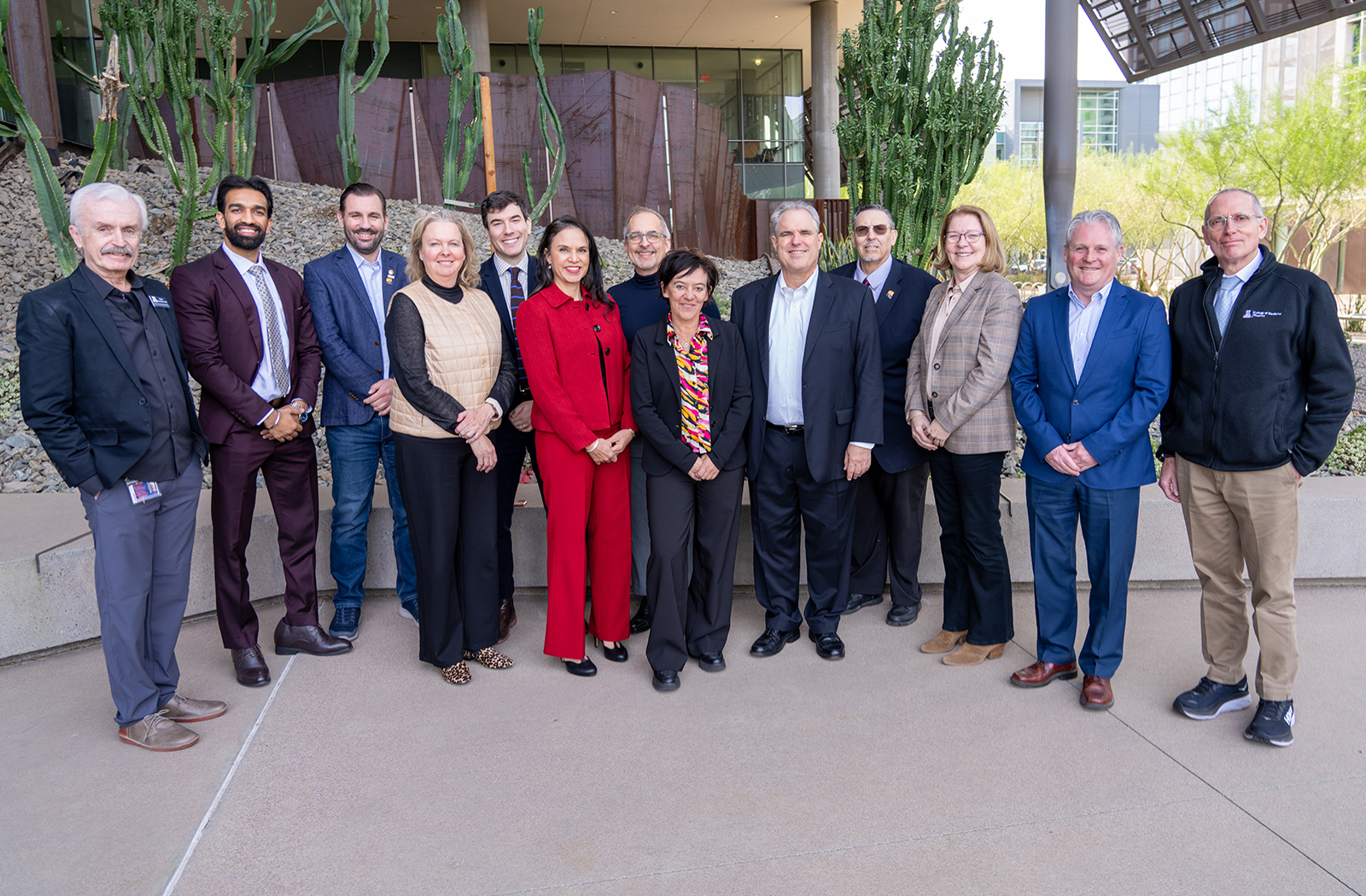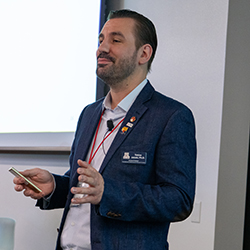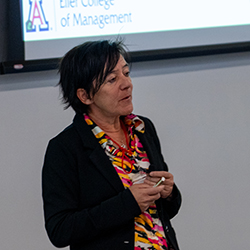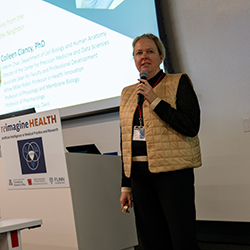
reimagine Health Research Symposium Discussed the Trending Topic of Artificial Intelligence

Artificial intelligence (AI) has great potential for speeding medical innovations and enhancing health care.
Through the 7th Annual reimagine Health Research Symposium on Artificial Intelligence in Medical Practice and Research, the University of Arizona College of Medicine – Phoenix sought to address emerging advantages and challenges with the rapid growth in AI usage in medicine.
This year brought the highest number of registrants and attendees to date and featured presentations from both local and national experts in the field.

Chris Glembotski, PhD — vice dean of Research, professor of Internal Medicine and director of the Center for Translational Cardiovascular Research — opened the symposium and expressed his enthusiasm about the program saying that he hoped we would all “become a little more knowledgeable about AI in medicine and scientific research and start thinking about how what we learn today applies to clinical practice, education and research at the U of A College of Medicine – Phoenix,”
Michael Fallon, MD, FACP, vice dean of clinical affairs and chair and professor of the college’s Department of Internal Medicine, stated in his opening remarks that he saw the biggest opportunity of this conference regarding its connection between the clinical and investigative components.
“It places us in a position where everybody who has interesting clinical questions can be involved in investigation without spending time in a wet lab,” Dr. Fallon said. “I’m excited to see how that evolves over the next 5-to-10 years, particularly for young people coming into medicine.”
Tobias Jakobi, PhD, assistant professor for the U of A College of Medicine – Phoenix’s Department of Internal Medicine, kicked off the presentations with his discussion of AI usage in bioinformatics and clinical research.
Dr. Jakobi introduced the different types of AI and their respective functions in society, including deep learning and generative AI — the latter being the recent trending topic of the field. He also discussed how AI is already being used in clinical research and has been used for many years.
“AI is fantastically good at image analysis and detecting features, such as tumors, in images that humans might not even be able to see,” Dr. Jakobi said. “However, we need large sets of data to train AI systems now to accurately detect such features. Training and learning of AI systems requires a lot of resources.”
Dr. Jakobi discussed that generative AI can be beneficial in creating code, but it should only be recommended if you already know the information.
“Generative AI really helps if you are already an expert in the matter,” Dr. Jakobi said. “Otherwise, you should be careful how to use its output.
Gondy Leroy, PhD, professor of Management Information Systems and associate dean for Research at the University of Arizona Eller College of Management, spoke about data, model and validation considerations for using AI in medicine. Dr. Leroy’s research focuses on machine learning, a critical part of AI, in medical context. She stated that the four components of “real intelligence” include knowledge, learning, language and reasoning.

When using generative AI, Dr. Leroy stated that it is important to know where the information and data is coming from.
“In one of our projects, we tried to simplify medical information for people; and simplifying text is not hard if you give the generative AI model a text. It drops some information, but that’s still good,” Dr. Leroy said. “If you give ChatGPT just a couple of terms and ask it to write an introduction, it’s not that good because it’s just putting together the words you provided.”
Justin Starren, MD, PhD, FACMI, the director of the Center for Biomedical Informatics and Biostatistics at the University of Arizona Health Sciences, discussed the non-AI factors to consider when applying AI to health care. Dr. Starren noted that generative AI, when used appropriately, could help fight against burnout among nurses and physicians. He also discussed the unintended consequences that using generative AI could have.
Dr. Starren shared that some surveys show that physician burnout is up to 93%, while burnout in nurses is up to 62%. “AI can lead to a loss of decision making and makes humans lazy,” Dr. Starren said. “When you bring in AI, you’re not just changing the system, but you’re also changing the people who use the system.”
Colleen Clancy, PhD, director at the Center for Precision Medicine and Data Sciences at the University of California Davis Health, discussed the need for new non-opioid pain medication and how AI can be used to speed up drug discovery. “Now is the moment to move away from reductionism and apply the power of AI to these complex systems that we as humans cannot efficiently reduce to understand how all the parameters come together to produce the disease,” Dr. Clancy said. She explained that the National Academies report stated that digital twins could be the method used to revolutionize the health care industry and biomedical sciences. A digital twin is a virtual representation of something that has a physical counterpart.

“There’s always going to be a human reviewing the prediction that’s coming out of the digital twin and that human will make a determination about whether or not the data make sense,” Dr. Clancy said. “AI is never going to treat your patient. The most important part is that there’s a human involved in the final decisions.”
Tools such as AlphaFold improve the accuracy of structure prediction, which then paves the way for better drug design. This has advanced the field of drug research significantly, allowing for quantitative information on drug interactions with the target to proliferate.
The symposium also featured presentations by Jesse Burk Rafel, MD, MRes, an assistant professor at New York University Grossman School of Medicine, Gurukripa Kowlgi, MBBS, MS, an assistant professor of medicine at Mayo Clinic, and Frank Rybicki, MD, PhD, FACR, FAHA, chair of the Department of Radiology at the College of Medicine – Phoenix.
The symposium is hosted by the College of Medicine – Phoenix Translational Research Office and is sponsored annually by the Arizona Biomedical Research Centre, and the Flinn Foundation the event concluded with a panel discussion that was enthusiastically received by the attendees. This discussion was followed by a networking reception, which proved to be most productive.
Topics
About the College
Founded in 2007, the University of Arizona College of Medicine – Phoenix inspires and trains exemplary physicians, scientists and leaders to advance its core missions in education, research, clinical care and service to communities across Arizona. The college’s strength lies in our collaborations and partnerships with clinical affiliates, community organizations and industry sponsors. With our primary affiliate, Banner Health, we are recognized as the premier academic medical center in Phoenix. As an anchor institution of the Phoenix Bioscience Core, the college is home to signature research programs in neurosciences, cardiopulmonary diseases, immunology, informatics and metabolism. These focus areas uniquely position us to drive biomedical research and bolster economic development in the region.
As an urban institution with strong roots in rural and tribal health, the college has graduated more than 1,000 physicians and matriculates 130 students each year. Greater than 60% of matriculating students are from Arizona and many continue training at our GME sponsored residency programs, ultimately pursuing local academic and community-based opportunities. While our traditional four-year program continues to thrive, we will launch our recently approved accelerated three-year medical student curriculum with exclusive focus on primary care. This program is designed to further enhance workforce retention needs across Arizona.
The college has embarked on our strategic plan for 2025 to 2030. Learn more.